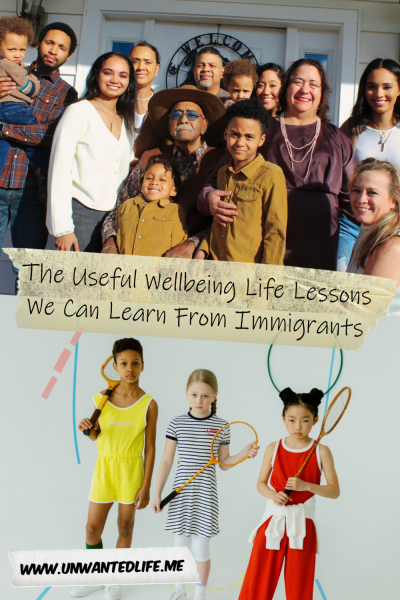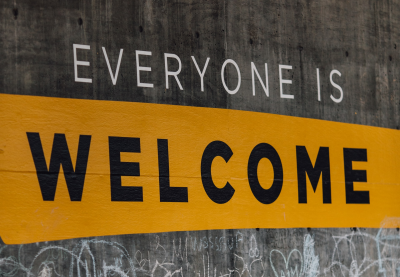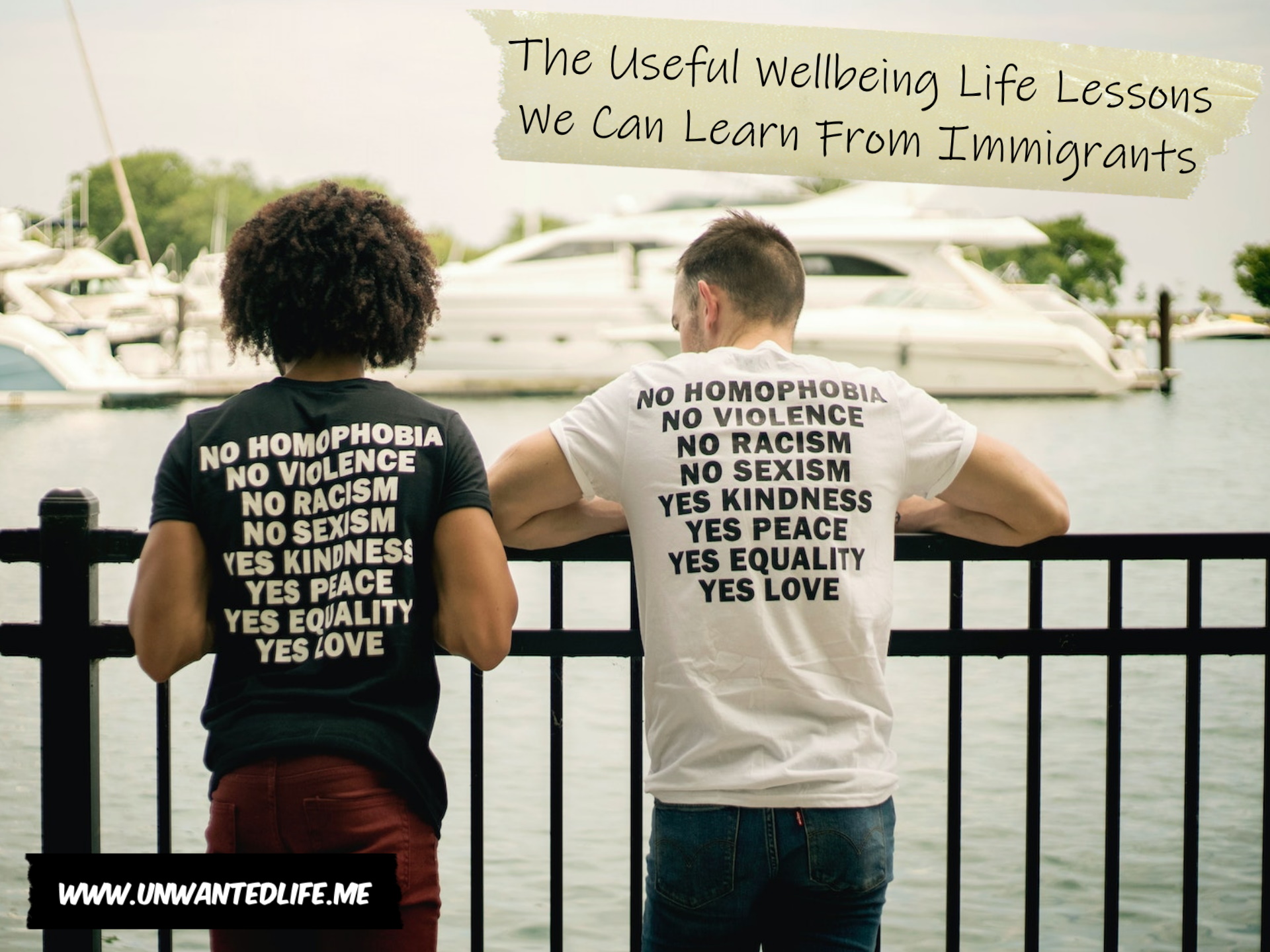With the war raging in Ukraine, not to mention other parts of the world, now seemed like a good time to talk about immigrants. The word we use instead of expats for people we don’t identify with. With Christmas upon us, and with most religions teaching us to be kind, why is it we still treat immigrants so badly? A question for another time, maybe. I’m an invisible disabilities blogger who mainly talks about mental health and self-care, so what can immigrants teach us about this? Let’s find out.
I’m a child of a so-called immigrant by way of one of my parents. Although, legally speaking, they’re from a British Overseas Territory and thus shouldn’t be seen as such, but they are. Of course they are. Have you seen Brexit or heard what Prince William’s godmother Lady Susan Hussey said to a Black woman? I’ve found myself in that situation many, many times.
I was born in the UK, with the White side of my family all being born in the UK, and my Black side has the right to British citizenship. Because the people of the British Overseas Territories are British Nationals. So I’m British on both sides, going back generations and generations. But that doesn’t matter because of the colour of my skin.
Anyway, I digress. Christmas is the time of year where many people celebrate the birth of Jesus, while acting more like the innkeepers, turning people in need away. Nothing says loving your fellow man like ignoring the plight of immigrants and refugees, even though that’s what Jesus’ family was. Regardless, many people of faith say they’ve learnt from these religious figures. But what else can we learn from immigrants and refugees?
Important Lessons We Can Learn From Immigrants
Sahaj Kohli
An interview conducted by CNN, where they interviewed Sahaj Kohli, who had immigrated from India to the UK, taught us a few things we could learn from immigrants. The first thing I thought was an important life lesson, not just for other immigrants and refuges, was that seeking your parents’ approval can be harmful.
We would all like our parents to be proud of us, but often that means living a life they want us to have, not the one we want to have. This can not only be harmful to the relationship between parent and child, but has a ripple effect throughout the child’s entire life. Your parents don’t get to live vicariously through you, nor can they dictate how you should live your life. That’s toxic behaviour and often anti-LGBTQIA+.
Another thing we can all learn from Sahaj Kohli experience is the importance of self-care. Self-care isn’t selfish, but rather it helps us perform at our best in the roles we’re responsible for. The same goes for attending therapy. It’s also important to remember that self-care looks different for everyone. A basic example of that is that my partner loves to read books, whereas my dyslexia making reading a book a chore.
Another piece of important life advice was to build a support system both inside and outside of your family. Connecting with people who have the same values as you, which you might not always share with your family, can be a wellbeing game changer.
One last piece of advice I took from this interview was the importance of not isolating yourself. Whether you’re struggling with your identity (gender identity, sexuality, ethnicity, etc.), or something else, you don’t need to go through this alone and there is support available. Because of the identity struggles of changing cultures and being non-White in a White dominated country, Sahaj Kohli founded Brown Girl Therapy. Check it out and tell her I said hi!
Crystal Shao
While interning for The Everygirl, Crystal Shao wrote an article about the things she learnt from her immigrant parents. One of the things she learnt was that we should all start paying more attention to, especially because of the pandemic and the importance of our health. Both health and mental health. It’s hard to take care of others, fulfil our duties, or grow as a person, if we neglect our health: “our bodies are like batteries that need charging”. This recharge can range from eating properly, self-care, seeking treatment, exercise, etc. You get the idea.
Another thing Crystal learned from her parents was the importance of knowledge and making that a lifelong pursuit. Seeking knowledge helps with problem solving, as well as curiosity being a healthy thing to nurture. Furthermore, most intolerance and discrimination comes from ignorance, which can be overcome with knowledge.
In fact, learning to bridge such differences was something Crystal learnt from her immigrant parents as well. Navigating different cultures can be hard, but the rewards of doing so outweigh that difficulty. However, it can mean that you have many contentious conversations, as Crystal did with her parents. Learning how to have such chats without trying to aggravate each other is a healthy life skill for us all to learn.
Speaking of knowledge, it’s also good to remember that love can take many forms (accept abuse, that’s not love). For some people, saying “I love you” might not be something you hear often, but that doesn’t mean your loved ones don’t show their love in other ways. For Crystal, her mother showed love through acts of love. Although I can tell someone I love them, my love language is gift giving, because I can struggle with intimacy. We can also show our love in different ways, that’s the point.
In our cost-of-living (greed) crisis, the frugality that Crystal learnt from her parents is even more useful. Many immigrant and refuge families have learnt the hard way how to get by on the bare minimum, if not less. Although no one should have to survive like this, such hard learnt habits can help avoid excess when their situations improve.
Fortunately, we can learn the benefits of frugality without having to experience that level of hardship. Avoiding excess, the Lagom way, can help us live happier and more content lives, rather than throwing money around and flirting with debt.
The most important lesson, I feel, that Crystal learned from her parents is that we should always choose kindness. It’s good to be kind, and it’s nice to be kind to everyone involved. As Crystal puts it, it doesn’t matter what your background is, if you’ve had a bad day, or what your socioeconomic status might be, always choose to be kind. The world is hard enough as it is, so let’s not make it harder.
Taking this kindness approach to life can also help you change your mindset to a more positive one. If you’d like to learn more about how to help develop a more positive mindset, then check out my article on positive psychology by clicking here.
Dr Tramontana
Writing for the University of Warwick, Dr Tramontana outlined several lessons we can learn from the history of immigration. One of the key points was that we were all once the “other” from someone’s perspective, especially in America and Australia. My family name dates back to the Norman conquest, but likely came over from France as part of that conquest. Even the British royal family is a Germanic family, but they’re seen as a key part of British Culture.
The Brits themselves are a mix of Normans, Scandinavia, Angles, Saxon, Picts, Celts, and basically a smorgasbord of European communities. But let’s not forget, those that aren’t White aren’t new to the UK either. They’ve been here for hundreds of years as well.
In fact, the oldest almost complete modern human found in Britain, known as the Cheddar Man, was alive 10,000 years ago and has the genetic markers of skin pigmentation associated with sub-Saharan Africa (Natural History Museum). In short, the first people in what we call the UK were Black, as is the case with the rest of Europe.
According to Dr Tramontana, as well as most people who’ve paid attention, immigrants have always proven to be beneficial for the “hosting” societies. They bring fresh ideas, new approaches, new food, new cultures, and a wider gene-pool, which is good for the health of all of us. They’re also good for the economy, although that shouldn’t matter. No one’s worth should be based on their monetary value.

Jochebed Fekadu
Now, I’m never a fan of making comparisons, I even wrote an article on why you shouldn’t do that. However, this may be(?) an exception. Jochebed Fekadu, a daughter of immigrants from Ethiopia, learned that it’s important to stay grounded. We can all get caught up in things that don’t really matter, while people around the world are praying to have half the life we have in the West.
So ask yourself, is it worth getting caught up in trivial things that ruin your mental wellbeing? You have the chance to live a good life, so do that, and do that through kindness.
Spread love and go out of your way to talk to someone new today. Don’t let your differences with others build a wall between the two
Joanna Henderson
According to Joanna Henderson, it takes a lot of mental effort, bravery, and resilience to leave a life behind to become an immigrant or refugee. And she’s not wrong. I know I don’t think I’d be strong enough to travel halfway across the world, not knowing if you’d live to reach your goal of a new and better life. Putting everything on the line is a level of dedication, motivation, and self-discipline I don’t think I have. Although, it’s not like they have a lot of options most of the time.
Everyone deserves the chance to live a good and happy life, and it disgusts me that governments don’t think like that. As you might be able to tell, I’m anti-borders.
Nevertheless, there is a lesson we can take from this, and that’s the importance of motivation and self-discipline to better our situations. A hard lesson to master. I can testify to that. However, a lesson once mastered that comes with huge rewards for our mental wellbeing and overall happiness.
Summary
The way our governments often stigmatise immigrants and refugees, you’d think they weren’t people they were talking about. But they are. They are people who have the same right to live a happy and safe life wherever that may be. What’s more, society benefits greatly from having people from different cultures, which is why we can learn a lot from immigrants and refugees, as well as from different cultures in general. So let’s use our holiday spirit to welcome these people the way they should be.

As always, leave your feedback in the comments section below. Also, please share your experiences with what you’ve learnt from immigrants in the comments section below as well. Don’t forget, if you want to stay up-to-date with my blog, then sign up for my newsletter below. Alternatively, get push notifications for new articles by clicking the red bell icon in the bottom right corner.
Lastly, if you’d like to support my blog, you can make a donation of any size below. Until next time, Unwanted Life readers.


Yes, immigrants are also humans and must be treated as such. It’s really not their fault that they’re choosing to leave their countries. Most of them do so for their safety, because they have no choice. Thank you for this educative post. I love it.
I’m glad you liked it and I’m glad we share similar views on the matter
I love this and I have never understood why people can’t embrace and accept people from other cultures. There is so much we can learn from each other and it just makes us all better. Celebrating other cultures’ holidays and traditions doesn’t lessen our enjoyment of our own. In fact, it can make us appreciate them all the more.
I was reminded of this last week when I attended a Christmas gathering at the home of a friend and co-worker. She is Hindu, originally from India. When her daughter was in high school, a Muslim friend asked her why she celebrated Christmas when she was Hindu. Her answer…”At our house, we celebrate EVERYTHING.” What an amazing way to look at life!
My family immigrated to Canada from England in the 1970s. While we didn’t have the struggles of many immigrants because we were white, English-speaking immigrants, it still must have taken a lot of courage for my parents to uproot our family in search of a better life. I can’t imagine how difficult it must be for many of the refugees who arrive in our countries with nothing, only to be mistreated and discriminated against by small-minded people in their chosen land.
It’s certainly a great idea to celebrate everything if we’re going to celebrate somethings, and bring all our cultures closer together
Great lessons we learn from immogrants. I’ve had a Chinese friend for two years. He had some really good lessons as well. These are very helpful as well. It was a lovely and informative read!
Thanks for commenting
I could not agree more that it does indeed take an incredible amount of strength and courage to leave behind a birthplace for something unknown and ideal. I love that you have highlighted several amazing stories here and shared learning takeaways through each story as they relate to our everyday life and wellbeing! <3
Thanks for sharing your thoughts
I believe immigration is good for society, for the reasons above and it can make us more open-minded.
Indeed. Thanks for commenting
As an immigrant myself, but a luxury privileged immigrant, I have learned many lessons from meeting people from all over the world. I grew up in a tiny village, with now people with a different background. I was amost all pretty much family. Then when I started traveling, I got to learn so much from everyone. One of the main things I noticed was that everyone wants the same. To have and provide for the best and healthy life for themselves and those around them. It humbled me and showed me how privileged I really am. I feel bad when I hear your experience because we are all one people and it makes me sad when people don’t see that or are to afraid or, as you perfectly point out, are too ignorant. One of my wedding celebration was held in Morocco and I was glad to see that many of my family members joined. They got to first hand see that they are lovely and welcoming people and lived the same way they did. It changed to view that many of them had before.
The lesson you have shown here are important to remember. And if we keep an open mind and heart, then we can learn from one another. Thank you for contributing in educating me and your readers. Not just on topics as well-being and mental health, but on tolerance and accepting everyone for who they are. This post humbled me and made me even more grateful for what I have. I wished it was possible for everyone. Thanks.
Thank you for sharing your story. The world has so much to offer, but too many people don’t seem to care. But when all is said and done, people just want to live a happy and safe life. If governments helped us all live like that, the world would be a better place
I couldn’t agree more. We can learn so much from immigrants. I think it’s probably the media’s fault in how they portray them. I can relate to a lot of what you’ve said about family wanting their children to go down a certain path – it can be so damaging. Great post- thanks for sharing. Jade MumLifeandMe
It’s weird how families can have this path in the head that you’re meant to take to be the person they think you should be, but at no point do they consider if that’s what the child even wants. Thanks for commenting
Another great post! Funny how similar ‘different’ people can be. But most people don’t see that. They hear the fear-mongering (from just about everywhere) and allow it to cloud their beliefs and behaviors. Kindness, compassion, and understanding would go a long way. I loved the lessons too…self-care is so very important. Taking care of our bodies, minds and souls is crucial to living a happy life. Thank you so much for sharing! Be well. ✌️
Certain media sources love to make us feast on fear and hate, because it suits their business model. Kindness just doesn’t get the same response or coverage. Thanks for commenting
Resilience and strength are two immediate takeaways for me. Thank you so much for personalizing a large often misunderstood group.
We can learn so much from people who have endured the trauma of relocating. Such an insightful post.
Indeed we can. But rather than learning from the trauma they experience, maybe it would be better to make sure that people who are relocating don’t experience trauma in the first place
Thanks for commenting